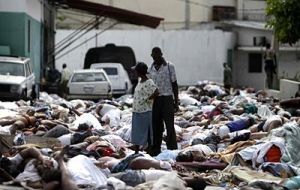MercoPress. South Atlantic News Agency
Rebuilding quake-shocked Haiti could soar to 14 billion USD says IDB
 The study calculates damages bases on 250.000 dead or missing
The study calculates damages bases on 250.000 dead or missing The cost of rebuilding Haiti’s homes, schools, roads and other infrastructure could soar to nearly 14 billion US dollars according to a new study by economists at the Inter-American Development Bank.
The study offers a preliminary estimate of the potential damages resulting from the January 12 earthquake, using simple regression techniques employing data from past natural disasters and their damage estimates. It takes into account several variables including the magnitude of the disaster, the number of fatalities, and the affected country’s population and per capita GDP.
The new IDB study indicates the cost is likely to be larger than anticipated. The study calculates damages assuming either 200,000 or 250,000 people dead or missing (as of Feb. 11, the Haitian government had reported 230,000 dead).
IDB economists Andrew Powell, Eduardo Cavallo and Oscar Becerra calculated a base estimate of 8.1 billion USD for a 250,000 dead-or-missing toll, but they estimate this figure is likely to be at the low end and conclude that an estimate of 13.9 billion is within the statistical margin of error.
While the results are subject to many caveats, the study confirms that the Haitian earthquake is likely to be the most destructive natural disaster in modern times, when viewed in relation to the size of the Haiti’s population and its economy.
Indeed, in this respect the Haiti earthquake was vastly more destructive than the Indonesian Tsunami of 2004 and the cyclone that hit Myanmar in 2008. It caused five times more deaths per million inhabitants than the second-ranking natural killer, the 1972 earthquake in Nicaragua.
Powell, Cavallo and Becerra conclude that the scale of the damages in Haiti will require unprecedented coordination among the multiple bilateral, multilateral and private donors. To ensure the efficient use of billions of dollars in reconstruction funds, for example, individual donors may need to surrender the kind of control and conditionality they typically demand of projects they finance. This will in turn require extraordinary mechanisms to ensure transparency and accountability.
Moreover, a separate forthcoming study by Cavallo and others indicates that countries hit by disasters on this scale suffer an economic setback that can take decades to reverse. In several such countries, investigators found that even with big inflows of outside aid, GDP per capita was up to 30% lower 10 years after the disaster than it would have been if the country had been spared.
“Of course this does not necessarily mean that aid does not work, perhaps the negative growth effect would have been even worse if aid had not increased,” the study notes. “However, this does underline the challenge ahead for Haiti and for the international community attempting to support the country”.




Top Comments
Disclaimer & comment rulesCommenting for this story is now closed.
If you have a Facebook account, become a fan and comment on our Facebook Page!